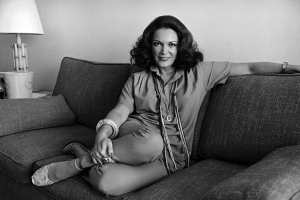Connie Francis, whose hit songs included 'Who's Sorry Now?' and 'Pretty
Little Baby,' dies at 87
[July 18, 2025]
By BOB THOMAS
LOS ANGELES (AP) — Connie Francis, the wholesome pop star of the 1950s
and ‘60s whose hits included “Pretty Little Baby” and “Who’s Sorry Now?”
— the latter would serve as an ironic title for a personal life filled
with heartbreak and tragedy — has died at age 87.
Radio DJ Bruce “Cousin Brucie” Morrow, a longtime friend, told The
Associated Press that she died Wednesday at a hospital in Florida, the
state where she had lived for years. Morrow did not cite a specific
cause of death, but Francis had posted on social media earlier this
month that she had been hospitalized with “extreme pain.”
Francis had gained renewed attention in recent months after “Pretty
Little Baby” became a sensation on TikTok, with Kim Kardashian and Kylie
Jenner among the many celebrities citing it.
“I’m flabbergasted and excited about the huge buzz my 1962 recording of
‘Pretty Little Baby’ is making all over the world,” she said in a video
on TikTok, which she had joined in response to the song's unexpected
revival. “To think that a song I recorded 63 years ago is captivating
new generations of audiences is truly overwhelming for me.”
Francis was a top performer of the pre-Beatles era, rarely out of the
charts from 1957-64. Able to appeal to both young people and adults, she
had more than a dozen Top 20 hits, starting with “Who’s Sorry Now?” and
including the No. 1 songs “Don’t Break the Heart That Loves You” and
“The Heart Has a Mind of Its Own.” Like other teen favorites of her
time, she also starred in several films, including “Where the Boys Are”
and “Follow the Boys.”
The dark-haired singer was just 17 when she signed a contract with MGM
Records following appearances on several TV variety shows. Her earliest
recordings attracted little attention, but then she released her version
of “Who’s Sorry Now?” an old ballad by Ted Snyder, Bert Kalmar and Harry
Ruby.
It, too, had little success initially until Dick Clark played it on his
“American Bandstand” show in 1958. Clark featured her repeatedly on
“American Bandstand,” and she said in later years that without his
support, she would have abandoned her music career.

Francis followed with such teen hits as “Stupid Cupid,” “Everybody’s
Somebody’s Fool” and “Lipstick on Your Collar.” Her records became hits
worldwide as she re-recorded versions of her original songs in Italian
and Spanish, among other languages. Her concerts around the country
quickly sold out.
Meanwhile, a romance bloomed with fellow teen idol Bobby Darin, who had
volunteered to write songs for her. But when her father heard rumors
that the pair was planning a wedding, he stormed into a rehearsal and
pulled a gun on Darin, ending their relationship and seeming to set
Francis on a pained and traumatic path.
She chronicled some of it in her autobiography, “Who’s Sorry Now?”
[to top of second column]
|

In this Nov. 27, 1978 file photo, singer Connie Francis poses for a
portrait in Los Angeles. (AP Photo/Wally Fong, File)
 “My personal life is a regret from A
to Z,” she told The Associated Press in 1984, the year the book came
out. “I realized I had allowed my father to exert too much influence
over me.”
Her father, George Franconero, was a roofing contractor from New
Jersey who played the accordion. She was just 3 when her father
presented her with a child-size accordion, as soon as she began to
show an aptitude for music. When she was 4, he began booking singing
dates for her, going on to become her manager.
Although her acting career had faded by the mid-1960s, Francis was
still popular on the concert circuit when she appeared at the
Westbury Music Fair in Westbury, New York, in 1974. She had returned
to her hotel room and was asleep when a man broke in and raped her
at knifepoint. He was never captured.
Francis sued the hotel, alleging its security was faulty, and a jury
awarded her $2.5 million in 1976. The two sides then settled out of
court for $1,475,000 as an appeal was pending. She said the attack
destroyed her marriage and put her through years of emotional
turmoil.
She suffered tragedy in 1981 when her brother George was shot to
death as he was leaving his New Jersey home. Later that decade, her
father had her committed to a psychiatric hospital, where she was
diagnosed as manic-depressive. At one point, she tried to kill
herself by swallowing dozens of sleeping tablets. After three days
in a coma, she recovered.
Around that time, she wrote to President Ronald Reagan and
volunteered to help others, calling herself ″America’s most famous
crime victim.″ Reagan appointed her to a task force on violent
crime.
″I don’t want people to feel sorry for me,″ she told The New York
Times in 1981. ″I have my voice, a gift from God I took for granted
before. He gave it back to me.″
She was married four times and would say that only her third
husband, Joseph Garzilli, was worth the trouble. The other marriages
each lasted less than a year.
Concetta Rosemarie Franconero was born on Dec. 12, 1937, in Newark,
New Jersey. At age 9 she began appearing on television programs,
including “Arthur Godfrey’s Talent Scouts” and “The Perry Como
Show.” It was Godfrey who suggested she shorten her last name.
All contents © copyright 2025 Associated Press. All rights reserved |